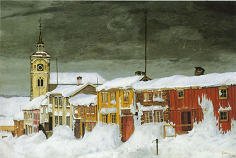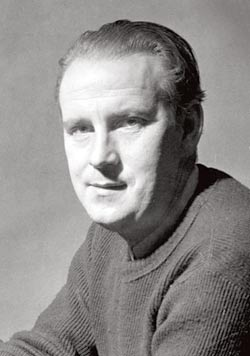11 Extras - LearnNoW
11 Extras
11.1
11.1 Ja - jo (yes)
For a positive answer to a question like the following, we use ja:
| Liker du teater? Do you like theatre? |
Ja, jeg liker teater. Yes, I do like theatre. |
If the question contains a negation, we use jo instead of ja:
| Liker du ikke teater? Don't you like theatre? |
Jo, jeg liker teater. Yes, I do like theatre. |
| Rydder ikke skomakeren? Doesn't the shoemaker tidy? |
Jo, han rydder. Yes, he does tidy. |
11.2
11.2 Short answers
Kortsvar
Instead of repeating the verb from the question, we use å gjøre (to do) in a short answer:
| Fisker du ofte? Ja, det gjør jeg. Do you fish often? Yes, I do. |
| Drikker du kaffe? Ja, det gjør jeg. Do you drink coffee? Yes, I do. |
This does not apply to auxiliary verbs as kan (can)* or har, er (have, are):
| Kan vi fiske her? Ja, det kan vi. Can we fish here? Yes, we can. |
| Har du kaffe? Ja, det har jeg. Do you have coffee? Yes, I have. |
| Er du sliten? Ja, det er jeg. Are you tired? Yes, I am. |
*skal (shall), vil (will), må (must), bør (ought to / should)
11.3
11.3 Two Norwegian painters
To norske malere
Edvard Munch (1863-1944) er Norges mest kjente maler. Han var en ekspresjonist. Han malte ikke bare det han så, men også det han følte. Maleriet Skrik fra 1893 er et eksempel på dette. Vi kan se mange av bildene hans i Munch-museet og i Nasjonalgalleriet i Oslo.
Edvard Munch (1863-1944) is Norway's most famous painter. He was an expressionist. He did not only paint what he saw, but also what he felt. The painting Scream from 1893 is an example of this. We can see many of his pictures in the Munch Museum and at the National Gallery in Oslo.
Harald Sohlberg (1869-1935) er også en viktig norsk maler, selv om han ikke er like berømt som Edvard Munch. Han er spesielt kjent for sine skildringer av fjellene i Rondane og byen Røros. Noen av hans mest kjente malerier er Vinternatt i Rondane og Etter snestorm.
Harald Sohlberg (1869-1935) is also an important Norwegian painter, even if he's not as famous as Edvard Munch. He is particularly known for his depictions of the mountains of Rondane and the town of Røros. Some of his most known paintings are Winter's Night in Rondane and After the Snowstorm.

Etter snestorm av Harald Sohlberg (Wikimedia Commons)
11.4
11.4 At - om (that - if)
As described in Chapter 8, the subordinating conjunctions at and om are used to form indirect statements and questions.
At (statement):
| De tror at han kommer til Gardermoen. They think that he will come to Gardermoen. |
| Rykter sier at han er i Oslo. Rumors say that he is in Oslo. |
Om (question):
| Dina spør om han kommer til Gardermoen. Dina asks if he will come to Gardermoen. |
| Dina spør om han er i Oslo. Dina asks if he is in Oslo. |
Om is also used to express doubt:
| Hun lurer på om han kommer. She wonders if he will come. |
| Hun vet ikke om han kommer. She doesn't know if he will come. |
| Hun er ikke sikker på om han kommer. She is not sure if he will come. |
11.5 Skomakerdokka
11.5 Skomakerdokka
 Excerpt of the original text of Alf Prøysen
Excerpt of the original text of Alf Prøysen
Copyright © Gyldendal Norsk Forlag AS
Skomakerdokka på www.nb.no
11.5 Vocabulary
| attpåtil (d) = in addition | |
| en | basar (n) = a kind of lottery |
| et | bek (n) = a tar (tar residue) |
| en | brille (n) = glasses |
| bruk for noe = need for any | |
| ei | bygd (n) = a village |
| du store all væla! = oh my! | |
| etter'n (etter den) = after it | |
| å | feie (v) = to sweep |
| fingra (fingrene) (n) = the fingers | |
| forundra (a) = puzzled, amazed | |
| et | golv (gulv) (n) = a floor |
| en | gummistøvel (n) = a rubber boot |
| hen (hvor __ hen) = where | |
| et | jafs (n) = a mouthfull |
| ei | kjerring (n) = a wife (old women) |
| å | lappe (v) = to patch |
| å | lette (v) = to lift |
| et | mas (n) = a nag |
| omkring = around | |
| å | reie (v) = to tidy |
| rein (a) = clean | |
| et | rusk (n) = a debris |
| sjøl (selv) = self | |
| ei | skosåle (n) = a shoe sole |
| ei | skuffe (n) = a drawer |
| å | skure (v) = to scrubb |
| slepp (slipper) (v) = are spared from | |
| en | stas (n) = a fuss (positive) |
| å | stelle (v) = to care for |
| å | søle (v) = to spill |
| vekk = away | |
| å | vende (v) = to turn |
| åssen (hvordan) (d) = how |

